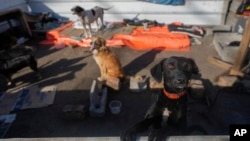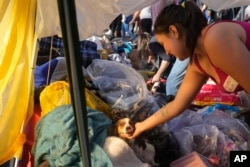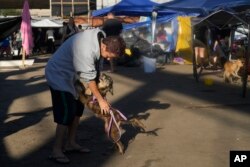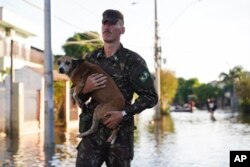Hundreds of volunteers have set up a makeshift dog shelter in an abandoned, roofless warehouse in the city of Canoas, one of the hardest hit areas by floods in southern Brazil's Rio Grande do Sul state.
They treat and feed sick, hungry or injured dogs, hoping to reunite them with their owners, and they were working at full speed Friday morning as renewed heavy rains are forecast in the region over the weekend.
Authorities say more than 110 people have died, almost 150 are missing, and more than 300,000 people have been displaced by the floods. There is no official tally for the number of animals that have died or are made homeless. Local media estimated the number to be in the thousands.
The makeshift shelter, about the size of a soccer field, has taken in hundreds of canines from inundated areas since Sunday. Every hour between 20 and 30 dogs arrive, many injured after having been run over or nearly drowned. The shelter sends some to veterinary hospitals, but others that are in need of medical attention are too frail to be transported. Dog food is scattered throughout the facility, and dogs are chained at distances from one another to prevent fighting.
Hairdresser Gabriel Cardoso da Silva is one of the main organizers. He came from the neighboring city of Gravatai, which wasn't hit by the heavy rains, to help rescue people.
“When we were about to leave, we heard the barking. I and my wife felt so moved, we just cried; we have two dogs,” said Silva.
Many more were drawn to the movement following a social media campaign, he added.
“Sunday we had 10 volunteers, now we have 200. We have tons of food. Our community chose to embrace this, but days ago we felt so alone.”
Whenever a dog is reunited with family, the hairdresser shouts “One less!” so other volunteers can stop and applaud throughout the shelter.
Cardoso's call often mixes with loud barks of small, jittery dogs; fights between distraught animals that manage to get close; and frantic movement by desperate families trying to locate their lost pets.
Eder Luis da Silva Camargo, a garbage collector in Canoas, found two of his six dogs at the center after searching for two days. Hunter and Preta were separated from him on Tuesday, as they boarded different boats during a rescue operation.
“They were so scared then, they ran to the side, and we couldn’t run after them. Now, thank God, we found them here,” Camargo said.
He and his wife, Jenifer Gabriela, want to find their four dogs that are still missing: Bob, Meg, Polaca and Ravena.
“This is the third place we came to look for them. This is great, but we still want to find the others,” Gabriela said.
Animal protection groups and volunteers have shared images of difficult rescues and heartwarming scenes of pets reuniting with their owners on social media. One video that went viral showed a man crying inside a boat, hugging his four dogs after rescuers went back to his home to save them. The images have spurred Brazilians to send donations and brought veterinarians to the region.
Gustavo Ungerer, a jiu-jitsu teacher who lives in Rio de Janeiro and treats stray animals during his spare time, will join a group of veterinarians heading south in just over a week.
They will bring food and medical supplies, assist cats and dogs that have found shelter and seek out those still fending for themselves, said Ungerer. One veterinarian specializes in larger animals, such as oxen and horses.
Stray animals "don’t know how to ask for help. They get scared and run away or attack when people approach to help,” he said by phone. “Sometimes it might be necessary to climb a house or enter into the river.”
The plight of lost animals in southern Brazil became national news this week after a television news helicopter spotted a horse nicknamed Caramelo stranded on a rooftop in Canoas, not far from the shelter.
About 24 hours afterward, and with people clamoring for his rescue, a team in Rio Grande do Sul on Thursday successfully removed Caramelo, providing a dose of hope to a beleaguered region.
Carla Sassi, chairwoman of Grad, a Brazilian nonprofit that rescues animals after disasters, said she met with state government officials in Canoas to discuss emergency measures to rescue pets, but that nothing came of it.
So far, according to volunteers in some areas, only business leaders and local residents have acted to save pets in flooded areas.
Rio Grande do Sul's housing secretariat says state agents have rescued about 10,000 animals since last week, while those in municipalities and volunteers have saved thousands more.







